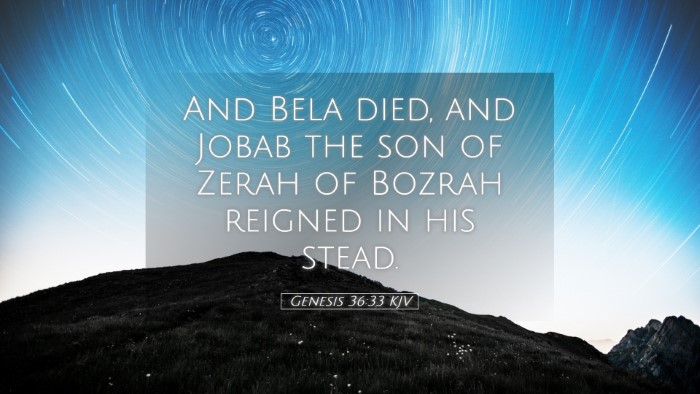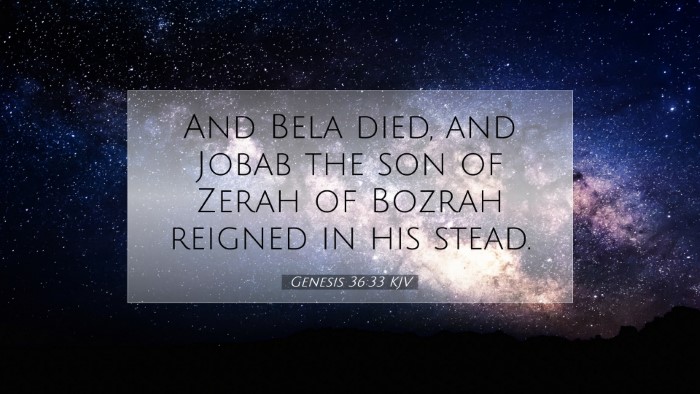Commentary on Genesis 36:33
Genesis 36:33 states: "And Bela the son of Beor reigned in Edom: and the name of his city was Dinhabah." This verse is part of the genealogical account of the descendants of Esau, providing essential historical context regarding the Edomite lineage and its kings.
Historical Context
The genealogy in Genesis 36 is significant as it details the fulfillment of God's promises regarding Esau, highlighting the separation between Jacob and Esau and the contrasting fates of their descendants. The Edomites, deriving from Esau, possessed significant territory and formed a lineage that would play crucial roles in the events of the Old Testament.
Key Themes in the Verse
- Lineage and Identity: The mention of Bela as a king represents the establishment of Edomite lineage, signaling the importance of leadership in ancient societies.
- Geography: Dinhabah, the city named in this verse, underscores the socio-political structure of Edom and its importance as a settlement during that time.
- Sovereignty of God: This verse illustrates God's providential governance over nations and peoples, affirming that even in secular rule, His sovereignty remained supreme.
Insights from Public Domain Commentaries
Matthew Henry's Commentary
Matthew Henry emphasizes the significance of rulers in biblical texts. He notes that the kings of Edom emerged prior to the establishment of kings in Israel (1 Samuel 8:5), which reflects God's timing and design in the governance of nations. Henry suggests that references to specific cities and rulers serve as reminders of the unfolding of God's redemptive plan through those whom He allows to have authority.
Albert Barnes' Notes on the Bible
Albert Barnes provides a detailed examination of the name Bela and his rulership. He posits that Bela, which means "destroyer," might signify a ruler's character or pose a reflection of the turbulent times in Edom's early history. Barnes draws attention to the historical accounts outside the Bible that corroborate the existence of Edomite kings and political structure, highlighting the interplay of divine revelation and historical narrative.
Adam Clarke's Commentary
Adam Clarke focuses on the implications of the city name Dinhabah. He notes that the etymology of the city name is unclear, but speculates that its mention indicates a prosperous urban center during Bela's reign. Clarke also discusses the significance of Edom's governance system, emphasizing how these early monarchs set precedents for later Israelite kings and shaped the geopolitical landscape of the region.
Theological Reflections
The list of Edomite kings highlights the importance of legacy and governance in biblical times. It raises critical questions relevant for theological discourse regarding divine sovereignty and human agency. The transition from tribal leadership to monarchy represents significant cultural shifts, resonating with the theologians who examine the nature of leadership as wielded by human beings under God's overarching authority.
Comparative Analysis with Israel's Monarchy
In contrasting Edom's kings with Israel's eventual monarchy, it is evident that God's chosen people followed a distinct theological and moral code, reflected in their governance. While Edom's kings were often evaluated based on political success, Israelite kings were held to a higher standard due to their covenantal relationship with God. This divergence invites further study into the consequences of differing foundational beliefs in shaping nations.
Application for Today
For pastors and theologians, Genesis 36:33 serves as a reminder that God is involved in the affairs of nations and that He is aware of the rise and fall of leaders throughout history. In an era where political and social upheaval is prevalent, understanding the historical precedents set by figures like Bela can ground contemporary discussions about leadership in a biblical context.
- Reflection on Leadership: How do we assess leadership in relation to our faith and the teachings of Scripture?
- Understanding Heritage: What lessons can we learn from our spiritual heritage and the histories of biblical nations?
- God's Sovereignty: In what ways do we see God's hand in current global politics and governance?
Conclusion
Genesis 36:33 encapsulates essential historical and theological themes, bridging ancient history with contemporary reflections on leadership and divine sovereignty. Through the insights provided by respected biblical commentators, readers are equipped to delve deeper into the implications of Edomite governance within the broader narrative of Scripture. This verse invites ongoing exploration of how God has orchestrated human history through leaders and nations, fostering a nuanced understanding applicable to today's context.


